AI Is More Than Just A Helper — It Can Improve Your Life
This image was created using StyleTransfer, an artificial intelligence neural network that transposes the style of one image onto another.
January 5, 2022
As an artificial intelligence enthusiast, I often get asked, “What is AI?”, “Will AI take my job?”, and “Is AI dangerous?”
Artificial intelligence is the process of teaching a computer to do a task by showing it examples of what it should be doing. This sort of programming is different from traditional programming where you write instructions for a program to follow.
The potential application of Artificial Intelligence is massive. We are at the cusp of a truly revolutionary moment where AI changes the shape of society in the same magnitude as the invention of the internet. Essentially, it allows the computer to be able to react to scenarios for which they were not originally programmed. One potential application of this could be cancer detection because all cancers look different from person to person. It has also been used in order to detect cancer at early stages. Theoretically, this is especially beneficial for tools like self-driving cars, where the cars may experience drivers behaving in ways that they were not originally programmed to expect.
However, our use of AI can expand even beyond purely mundane technical applications. AI can also be used in more artistic or creative ways, such as inventing new products, new filters that can make you look like the Mona Lisa, pioneering new ways to create music, or even assisting you with writing. All of these things either are currently possible with AI or will be in the very near future. However, I would like to note the very extreme pitfalls of AI in underrepresented communities. AIs have been deployed in many scenarios where they have been trained with deeply ingrained biases that harm underrepresented communities like people of color. In order to make AI beneficial to everyone, the issues of bias need to be addressed on a larger scale.
I believe that AI will further expand the human experience and allow for greater accessibility to technology and human knowledge.
Students would be able to have a hyper-personalized learning plan that matches their learning styles. Imagine an assistant that can take care of the elderly. Instead of needing to learn how each website or service works, you merely tell the artificial intelligence what tasks must be performed in your native language. The vast knowledge acquired through machine learning will allow for easy and efficient service. We are on the cusp of a revolution where AI will help solve many issues that we have been unable to solve until now, like climate change.
To help illustrate the genius of AI and the developments it will aid, GPT-3 (an advanced English AI) answered several questions mentioned at the beginning of this article.
Artificial intelligence is a broad term that refers to systems that are able to perform tasks that normally require human intelligence. Some of the most common applications of AI are in software that learns to recognize patterns in large data sets, and in systems that can translate language. Most of us use AI every day. When you call a customer service hotline, the voice recognition system is probably using AI. When you use GPS to get from one place to another, your phone is using AI to find the fastest route. AI is also in the software that helps your photos look better when you upload them to Facebook or Instagram. AI is also used in things that we don’t notice like the autopilot feature in airplanes and the anti-lock brakes in our cars.





